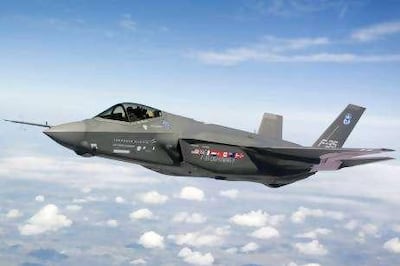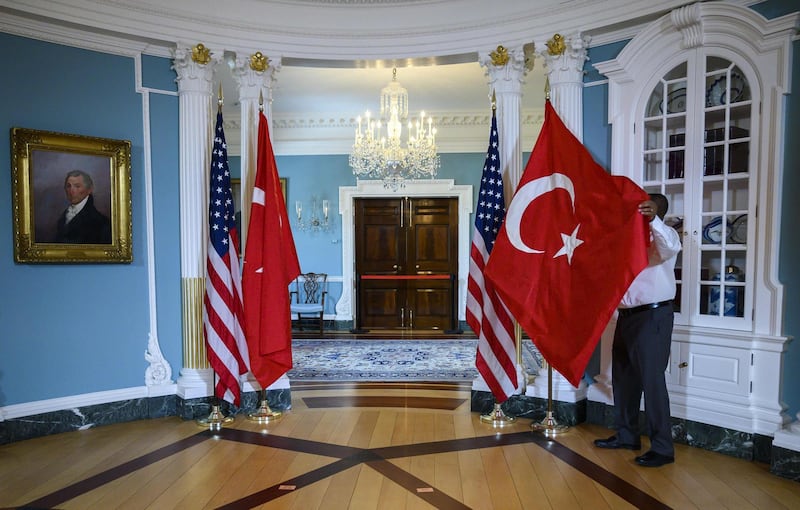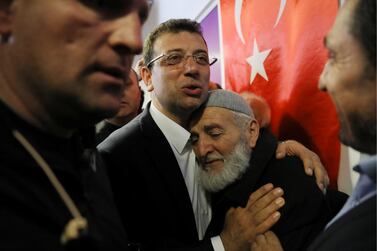A US bill calling for sanctions against Turkey over the arrest of its citizens and diplomatic staff has put further pressure on already fraught relations between the allies.
A bill was introduced to the Senate on Tuesday that demands sanctions on the Turkish officials who were involved in the decision to prosecute three Turkish staff members at US consulates and at least one US national.
It underlines a myriad of long-standing problems that plague relations between the Nato members, including Ankara’s decision to purchase missiles from Russia.
The Defending United States Citizens and Diplomatic Staff from Political Prosecutions Act requires the US government to act against “all senior Turkish officials responsible for the wrongful detentions of US citizens and staff,” according to a Senate statement. Sanctions would include a ban on travel to the US and the freezing of assets.
“Turkish authorities should immediately cease this harassment of our citizens and personnel,” said Roger Wicker, a Republican senator who introduced the bill on Tuesday.
“The bipartisan measure we are introducing today puts Turkey on notice that it can either quickly resolve these cases and free our citizens and local staff or face real consequences.
“Turkey is a valuable Nato ally — I expect it to start acting like one.”
Mitat Celikpala, an international relations professor at Istanbul’s Kadir Has University, said the move compounded existing disputes.
“Turkey and the US are moving away from any alliance,” he said. “We are coming close to breaking point and it may have some affect, not just on security relations but politically and economically.”
Among the cases highlighted by the bill is that of Nasa scientist Serkan Golge, a US-Turkish citizen. He is currently serving a five-year jail sentence over alleged links to US-based cleric Fethullah Gulen, who Ankara says was behind a 2016 coup attempt.
Mr Golge was among tens of thousands who were arrested in the wake of the failed takeover, including Andrew Brunson, an American pastor who was released last October.
Two Turkish employees of the US consulate in Istanbul, Metin Topuz and Mete Canturk, were also detained and face trial over links to Mr Gulen.
A third consulate employee, Hamza Ulucay, based in the southern city of Adana, was convicted of supporting the outlawed Kurdistan Workers’ Party (PKK). He was released in January after nearly two years in prison.
The threat of sanctions against President Recep Tayyip Erdogan’s government echoes measures imposed last summer, when the US acted against two government ministers over the detention of Mr Brunson. Those sanctions were dropped following his release and return to the US.
However, tariffs on Turkish steel and aluminium, which were doubled when an earlier deal to free the pastor collapsed, remain in place.

Turkey’s plan to buy S-400 missiles from Russia over the US’s Patriot missiles is another recent source of tension.
The US has urged Turkey to accept Patriot missiles instead of the Russian system, which it says would threaten the integrity of their F-35 fighter jets, due to be delivered to Turkey in November. It also said the missiles could be used to glean secrets about the aircraft and warned that it will not provide the jets if Ankara accepts the Russian system.
Such a move would be a blow to the Turkish defence industry, which has supplied parts for the multi-billion-dollar aircraft project.
Ankara has claimed, however, that the US will not meet its terms over the sale of the missiles. In an interview with broadcaster NTV on Wednesday, Turkish Foreign Minister Mevlut Cavusoglu said Turkey could buy more S-400s "if the US refuses to sell us Patriots". He added that the country would seek alternatives to the F-35 if they do not arrive on schedule.
Mr Erdogan told reporters on a return flight from Moscow on Tuesday that Turkey could even bring forward the S-400 agreement and take delivery of the missiles before July.
The row led Vice President Mike Pence to warn last week that the US would not “stand idly by while Nato allies purchase weapons from our adversaries, weapons that threaten the very cohesion of this alliance”.
Other matters that beset relations are the US’s failure to extradite Mr Gulen, who denies any involvement in the coup attempt; Washington’s support for fighters linked to the PKK in Syria; and potential sanctions against state lender Halkbank over its dealings with Iran.
Finance Minister Berat Albayrak, who on Wednesday outlined reforms to address Turkey's crisis-hit economy, is to visit Washington next week to woo investors concerned about relations with the West amid an ongoing dispute over local elections in Istanbul. He will be accompanied by the ministers for defence and trade.
“I don’t see any resolution,” Prof Celikpala said. “All these issues are interconnected and linked. They can’t be compartmentalised, they’re all in the same basket.”






